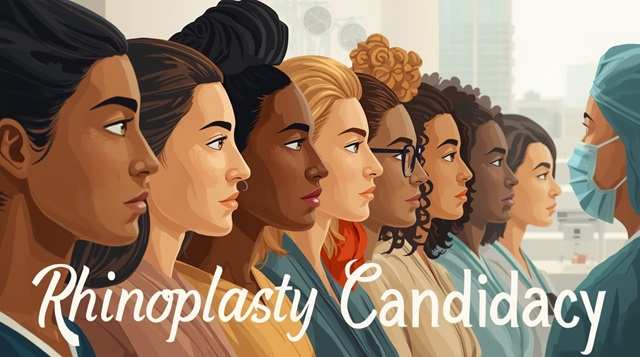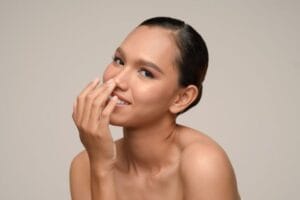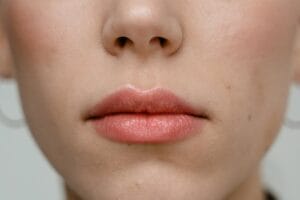Who Should Have Nose Surgery? A Complete Guide to Rhinoplasty Candidates
Quick Answer: Who Should Have Rhinoplasty ?
Good candidates for nose surgery (rhinoplasty) are typically adults in good physical health with fully developed facial features, realistic expectations, and specific concerns like breathing difficulties, aesthetic dissatisfaction, or structural deformities. They should be non-smokers, psychologically prepared for the procedure, and have consulted with a qualified plastic surgeon to discuss their goals and medical history.
Sarah had been thinking about it for years—every time she caught her reflection, that slight bump on her nose bridge caught her attention. But was she someone who should have nose surgery? The question isn’t just about wanting change; it’s about being the right candidate for rhinoplasty.
Rhinoplasty, commonly known as nose surgery, isn’t a one-size-fits-all procedure. In my practice, I’ve observed that successful outcomes depend heavily on patient selection. The best results come from matching the right procedure with the right person at the right time.
So who should have nose surgery? That’s what we’re diving into here. This isn’t about convincing anyone to get the procedure—it’s about understanding the factors that make someone a good candidate, what to expect, and how to make an informed decision.
Understanding Nose Surgery: What Makes a Good Rhinoplasty Candidate?
Before we get into who should have nose surgery, let’s clarify what we’re actually talking about. Rhinoplasty is a surgical procedure that reshapes or reconstructs the nose. But here’s the thing—it’s not always purely cosmetic.
There are two main types of rhinoplasty: cosmetic and functional. Cosmetic rhinoplasty focuses on improving the nose’s appearance, while functional rhinoplasty addresses breathing issues or structural problems. Many patients actually need both—that’s where things get interesting.
In many cases, the internal structure of the nose affects both form and function. A deviated septum might cause breathing problems while also affecting the nose’s appearance. This is why a comprehensive evaluation matters so much.
Cosmetic vs. Functional Rhinoplasty: Which Candidates Need Nose Surgery?
When discussing who should have nose surgery, understanding this distinction helps clarify whether the procedure is right for you. Functional rhinoplasty is often medically necessary—it corrects issues that impact your health and breathing.
Cosmetic rhinoplasty, on the other hand, addresses aesthetic concerns. But even “cosmetic” procedures require the same level of medical evaluation and consideration. The best surgeons don’t separate these categories too rigidly because they often overlap.
Age Requirements for Nose Surgery: When Should Candidates Consider Rhinoplasty?
This aspect is often overlooked, but age matters significantly when determining who should have nose surgery. The timing isn’t just about legal adulthood—it’s about physical development and emotional maturity.
Most plastic surgeons recommend waiting until facial growth is complete. For girls, this typically happens around age 15 or 16. For boys, facial bones continue developing until around 18 or 19. Performing rhinoplasty before this point can lead to complications because the nose might continue growing after surgery.
That said, there are exceptions. In cases of severe breathing problems or significant deformities from injury, functional rhinoplasty might be recommended earlier. But these decisions require careful evaluation by experienced surgeons.
Upper Age Limits for Rhinoplasty: Can Older Candidates Have Nose Surgery?
While there’s no strict upper age limit for nose surgery, older patients need thorough health assessments. Skin elasticity decreases with age, which can affect healing and results. However, many patients in their 50s, 60s, and even 70s successfully undergo rhinoplasty with proper evaluation and realistic expectations.
The key isn’t chronological age—it’s overall health status. A healthy 70-year-old might be a better candidate than an unhealthy 30-year-old. That’s what many patients find surprising about this procedure.
Health Requirements for Rhinoplasty: Who Qualifies for Nose Surgery?
Good physical health is non-negotiable for anyone who should have nose surgery. The body needs to heal properly, and underlying health conditions can complicate recovery or increase surgical risks.
Here’s what surgeons typically evaluate:
- Cardiovascular health: Heart conditions or uncontrolled high blood pressure can increase surgical risks. This doesn’t automatically disqualify you, but it requires careful management and clearance from your primary care physician.
- Respiratory function: Since rhinoplasty affects nasal structures, existing respiratory conditions need evaluation. Patients with severe asthma or COPD require special consideration.
- Bleeding disorders: Conditions that affect blood clotting can create significant risks during and after surgery. These must be identified and managed beforehand.
- Diabetes: Controlled diabetes usually isn’t a barrier, but uncontrolled blood sugar can severely impact healing. Your surgeon will need to work with your endocrinologist.
- Autoimmune conditions: Some autoimmune diseases affect healing and require specialized care plans.
Most people don’t realize how comprehensive this health screening actually is. It’s not just a quick check—it’s a thorough evaluation designed to ensure your safety.
Smoking and Rhinoplasty: Why Smokers May Not Be Good Candidates for Nose Surgery
If you smoke and are considering who should have nose surgery, here’s the reality: smoking significantly increases complication risks. Nicotine constricts blood vessels, which reduces blood flow to healing tissues. This can lead to:
- Delayed wound healing
- Increased risk of infection
- Poor scarring
- Compromised surgical results
Surgeons typically require patients to quit smoking at least four to six weeks before surgery and continue abstaining throughout recovery. For some surgeons, this is non-negotiable. The risks simply aren’t worth it—not just for the surgery, but for overall health outcomes.
Psychological Readiness: Mental Health Factors for Nose Surgery Candidates
Physical health isn’t the only consideration when determining who should have nose surgery. Psychological readiness matters just as much. This isn’t about judging someone’s reasons—it’s about ensuring realistic expectations and emotional stability.
Patients seeking rhinoplasty should have:
- Realistic expectations: Understanding that rhinoplasty can improve your nose but won’t transform your entire life or solve unrelated problems
- Stable mental health: While having body image concerns doesn’t disqualify you, severe body dysmorphic disorder or untreated mental health conditions require attention first
- Personal motivation: The decision should come from you, not pressure from others
- Emotional maturity: Understanding that recovery takes time and results develop gradually
In my practice, I’ve observed that patients who approach rhinoplasty with realistic expectations and personal motivation tend to be most satisfied with their results. This isn’t judgment—it’s about setting patients up for success.
Red Flags: Who Should Not Have Nose Surgery?
Certain psychological patterns suggest someone might not be ready for nose surgery:
- Expecting perfection or believing surgery will solve all life problems
- Seeking surgery due to pressure from partners, family, or social media
- Having multiple previous cosmetic procedures with ongoing dissatisfaction
- Unrealistic expectations about recovery time or results
- Current unstable mental health conditions that haven’t been addressed
That said, concerns about your appearance are completely valid. The distinction lies in having realistic expectations and making the decision for yourself.
Who Should Have Nose Surgery: Common Reasons Candidates Seek Rhinoplasty
Understanding why people seek rhinoplasty helps clarify who should have nose surgery. The reasons are diverse, and many are entirely valid medical or aesthetic concerns.
Functional Reasons for Nose Surgery: Breathing Problems and Health Issues
Many patients come to rhinoplasty with genuine health concerns, not just aesthetic ones. Common functional issues include:
- Deviated septum: A crooked nasal septum that obstructs airflow, making breathing difficult
- Nasal valve collapse: Weakness in nasal structures that causes airway obstruction
- Enlarged turbinates: Swollen nasal tissue that blocks airflow
- Previous injury: Nasal fractures that healed improperly, affecting both appearance and function
- Congenital deformities: Structural issues present from birth that impact breathing
Functional rhinoplasty can significantly improve quality of life for patients with breathing difficulties. These procedures are often medically necessary and may be covered by insurance.
Aesthetic Concerns: Appearance-Related Reasons for Nose Surgery
Cosmetic reasons for rhinoplasty are equally valid. Common aesthetic concerns include:
- Nasal humps or bumps: Prominent dorsal humps on the nose bridge
- Wide or bulbous tip: A nasal tip that appears too large or wide for the face
- Crooked nose: Visible asymmetry or deviation
- Proportions: A nose that feels too large, too small, or disproportionate to other facial features
- Asymmetry: Uneven nostrils or nasal structures
- Previous surgery dissatisfaction: Revision rhinoplasty to improve previous results
The key is that aesthetic concerns are real and valid—they affect self-confidence and quality of life. What matters is having realistic expectations about what surgery can achieve.
Ideal Nose Surgery Candidates: Who Benefits Most from Rhinoplasty?
While every patient is unique, certain profiles tend to benefit most from rhinoplasty. This isn’t about creating categories—it’s about understanding common scenarios where nose surgery proves particularly beneficial.
Who Should Have Nose Surgery: Patients with Breathing Difficulties
Individuals with documented breathing problems—whether from structural issues, previous injuries, or congenital conditions—are often excellent candidates for functional rhinoplasty. Patients with nasal obstruction experience significant quality-of-life improvements after properly performed functional rhinoplasty.
The improvement isn’t just physical. When you can breathe properly, sleep improves, exercise becomes easier, and daily activities feel more comfortable. That’s why functional rhinoplasty can be life-changing for the right patients.
Who Should Have Nose Surgery: Post-Traumatic Cases and Injury Candidates
Patients who’ve experienced nasal fractures or injuries often benefit from rhinoplasty. These cases combine functional and aesthetic concerns—the injury might have affected both breathing and appearance.
Here’s what you need to know: timing matters. Surgeons typically wait until swelling has fully resolved and bones have healed before addressing any remaining issues. This might mean waiting several months after the initial injury.
Ethnic Rhinoplasty Candidates: Who Should Consider Nose Surgery While Preserving Cultural Identity
Ethnic rhinoplasty respects and preserves ethnic characteristics while addressing specific concerns. Good candidates want refinement, not complete transformation of their ethnic features.
This requires surgeons with specific expertise in preserving cultural identity while achieving desired improvements. The goal is enhancement, not erasure of ethnic characteristics—and patients who understand this distinction tend to be excellent candidates.
Revision Rhinoplasty: Who Should Have Nose Surgery Again?
Patients seeking revision rhinoplasty—surgery to improve previous rhinoplasty results—represent a distinct category. These procedures are more complex because they involve working with scar tissue and altered anatomy.
Good candidates for revision rhinoplasty have realistic expectations about what’s achievable and understand that results might be more limited than with primary rhinoplasty. They’ve typically waited long enough for initial results to fully develop—at least a year, often longer.
Pre-Surgical Evaluation: Determining If You’re a Good Candidate for Nose Surgery
If you’re wondering whether you’re someone who should have nose surgery, the evaluation process will help answer that question. It’s comprehensive, and that’s intentional—your safety and satisfaction depend on it.
The Initial Consultation: Determining If You’re a Candidate for Nose Surgery
During your first consultation, expect a detailed discussion covering:
- Medical history: Complete health history, current medications, allergies, and previous surgeries
- Goals and expectations: What you hope to achieve and why you’re considering rhinoplasty
- Physical examination: Assessment of nasal structure, skin type, and facial proportions
- Photography: Detailed photos for planning and documentation
- Imaging: Some surgeons use computer imaging to help visualize potential results
This consultation is a two-way conversation. You should feel comfortable asking questions, and your surgeon should listen carefully to your concerns. If you don’t feel heard or if your surgeon seems dismissive, that’s a red flag worth paying attention to.
Realistic Goal Setting for Nose Surgery Candidates
One of the most important aspects of determining who should have nose surgery is setting realistic goals. Your surgeon should discuss:
- What’s achievable based on your anatomy
- Limitations and potential complications
- Recovery timeline and what to expect
- Long-term results and how the nose ages
Clinicians report that patients who have realistic expectations from the start are consistently more satisfied with outcomes. This isn’t about managing disappointment—it’s about aligning expectations with reality.
Recovery Considerations: Are Nose Surgery Candidates Prepared for Rhinoplasty?
Part of determining who should have nose surgery involves assessing your ability to handle recovery. Rhinoplasty isn’t a minor procedure, and recovery requires time and patience.
Immediate Recovery for Nose Surgery Candidates: The First Two Weeks
The initial recovery period involves:
- Swelling and bruising: Significant facial swelling and bruising around the eyes and nose—this peaks around days 2-3 and gradually improves
- Nasal packing: Some surgeons use nasal packing or splints, which can be uncomfortable
- Activity restrictions: No strenuous activity, bending over, or heavy lifting for several weeks
- Sleep positioning: Sleeping elevated to reduce swelling
- Follow-up appointments: Regular visits to monitor healing and remove sutures or splints
Most patients need about a week off from work or school. Some require two weeks, especially if their work involves physical activity or public-facing responsibilities. Plan accordingly.
Long-Term Recovery for Rhinoplasty Candidates: Months of Healing
Here’s what many people don’t realize: while most visible swelling resolves in weeks, final results take much longer. Subtle swelling can persist for months, even up to a year. The nose continues refining during this time.
Patients who should have nose surgery understand this timeline. They’re prepared for gradual improvement rather than immediate transformation. This mental preparation matters just as much as physical preparation.
Risks and Complications: What Nose Surgery Candidates Need to Know
No surgical procedure is risk-free, and understanding potential complications is essential for anyone considering who should have nose surgery. Informed consent means understanding both benefits and risks.
Common Risks for Nose Surgery Candidates
While rhinoplasty is generally safe when performed by qualified surgeons, potential risks include:
- Bleeding: Some bleeding is normal, but excessive bleeding or nosebleeds requiring medical attention can occur
- Infection: Rare but possible, infections require prompt treatment
- Adverse reactions to anesthesia: As with any surgery, anesthesia carries risks
- Breathing difficulties: In rare cases, rhinoplasty can worsen breathing (though it typically improves it)
- Numbness: Temporary numbness in the nose and upper lip is common
- Unsatisfactory results: Results might not match expectations, requiring revision surgery
Scarring is typically minimal with rhinoplasty since incisions are usually made inside the nose or in inconspicuous locations. However, some techniques require external incisions, which leave small scars.
How Nose Surgery Candidates Can Minimize Risks
Patients who should have nose surgery take steps to minimize risks:
- Choose a board-certified plastic surgeon or facial plastic surgeon with extensive rhinoplasty experience
- Follow all pre- and post-operative instructions carefully
- Disclose complete medical history and current medications
- Maintain good overall health before surgery
- Avoid smoking and certain medications that increase bleeding risk
The surgeon’s experience matters tremendously. Surgeon experience correlates strongly with patient satisfaction and complication rates. Don’t choose based on price alone—expertise matters.
Financial Considerations for Nose Surgery Candidates: Cost and Insurance
Understanding costs helps determine practical feasibility when considering who should have nose surgery. Costs vary significantly based on geographic location, surgeon experience, facility fees, and anesthesia costs.
Cosmetic vs. Functional: Insurance Coverage for Nose Surgery Candidates
Here’s an important distinction: purely cosmetic rhinoplasty typically isn’t covered by insurance. However, functional rhinoplasty—procedures that improve breathing or address medical issues—often is covered, at least partially.
If you have breathing difficulties documented by your primary care physician or ENT specialist, your insurance might cover the functional components of rhinoplasty. The aesthetic components would still be out-of-pocket. Many surgeons can separate these components for billing purposes.
That said, coverage varies by insurance plan. Always verify with your insurance provider before proceeding, and get pre-authorization when possible.
Total Cost Considerations for Rhinoplasty Candidates
Rhinoplasty costs typically range from $5,000 to $15,000 or more, depending on complexity and location. This includes:
- Surgeon’s fee
- Anesthesia fees
- Facility or hospital fees
- Pre- and post-operative appointments
- Medications and supplies
- Potential revision costs (though revision shouldn’t be assumed necessary)
Most surgeons require payment before surgery. Some offer financing options, but be cautious about taking on significant debt for elective procedures. Only proceed if you can afford it without compromising your financial stability.
Choosing the Right Surgeon: Essential for Nose Surgery Candidates
Perhaps the most critical factor in determining who should have nose surgery is choosing the right surgeon. Not all plastic surgeons specialize in rhinoplasty, and expertise varies significantly.
Credentials to Look For in a Rhinoplasty Surgeon for Nose Surgery Candidates
When researching surgeons, prioritize:
- Board certification: Certification from the American Board of Plastic Surgery or the American Board of Facial Plastic and Reconstructive Surgery
- Rhinoplasty specialization: Surgeons who perform rhinoplasty regularly (not occasionally)
- Before-and-after portfolios: Review actual patient results, especially patients with similar concerns to yours
- Patient reviews: Read reviews, but maintain perspective—no surgeon pleases everyone
- Consultation experience: You should feel comfortable, heard, and informed during consultation
Don’t hesitate to consult with multiple surgeons. This is a major decision, and you deserve to feel confident in your choice. The consultation process itself tells you a lot about a surgeon’s approach and whether you’ll work well together.
Red Flags to Avoid: Warning Signs for Nose Surgery Candidates
Warning signs that suggest you should look elsewhere:
- Surgeons who pressure you to book immediately or offer “limited-time” discounts
- Lack of board certification or unclear credentials
- Unwillingness to discuss risks and complications
- Inability to show before-and-after photos of actual patients
- Consultations that feel rushed or dismissive
- Surgeons who guarantee specific results
Good surgeons are confident but realistic. They’ll tell you what’s achievable and what isn’t. They’ll discuss risks openly. They won’t rush you or pressure you. If something feels off, trust that instinct.
Alternative Options: When Nose Surgery Candidates Should Consider Other Treatments
Understanding who should have nose surgery also means recognizing when alternatives might be better. Rhinoplasty isn’t the only solution for nasal concerns, and sometimes other approaches are more appropriate.
Non-Surgical Options: Alternatives for Candidates Unsure About Nose Surgery
For certain concerns, non-surgical rhinoplasty using dermal fillers might be an option. This can:
- Camouflage minor bumps or irregularities
- Add volume to specific areas
- Improve symmetry temporarily
- Provide results without surgery or extended recovery
However, non-surgical rhinoplasty has limitations. It can’t reduce nose size, fix breathing problems, or make dramatic changes. Results last 12-18 months, requiring ongoing treatments. It’s not right for everyone, but it might be worth discussing if your concerns are minor.
Other Surgical Alternatives for Nose Surgery Candidates
Depending on your specific concerns, alternatives might include:
- Septoplasty: Surgery to straighten a deviated septum without changing external appearance
- Turbinate reduction: Procedures to reduce enlarged turbinates improving breathing
- Nasal valve repair: Addressing collapsed nasal valves that obstruct airflow
Sometimes, addressing functional concerns separately from aesthetic ones makes sense. Your surgeon should discuss all relevant options, not just push toward rhinoplasty.
Making the Decision: Key Questions to Determine If You Should Have Nose Surgery
Determining who should have nose surgery ultimately comes down to honest self-reflection. Before scheduling a consultation, consider these questions:
Motivation Questions: Are You a Good Candidate for Nose Surgery?
- Are you seeking surgery for yourself, or to please someone else?
- Have you been considering this for a significant period, or is it a recent impulse?
- What specific concerns do you want addressed, and are they realistic for rhinoplasty to fix?
- How will improved results affect your daily life and confidence?
Practical Questions: Should You Have Nose Surgery?
- Can you afford the procedure without financial strain?
- Do you have time for recovery, including time off work if needed?
- Are you in good physical health, or are there health concerns to address first?
- Do you have realistic expectations about results and recovery?
Readiness Questions: Are You Ready to Be a Rhinoplasty Candidate?
- Are you psychologically prepared for the recovery process?
- Can you accept that results take time to develop fully?
- Have you researched surgeons and feel ready to begin consultations?
- Do you understand the risks and potential complications?
If you answered honestly and most answers point toward proceeding, you’re likely ready to begin consultations. But remember—consultation doesn’t commit you to surgery. It’s an information-gathering process, and you can always decide to wait or choose not to proceed.
Final Thoughts: Is Nose Surgery Right for You?
So, who should have nose surgery? The answer isn’t a simple checklist—it’s a combination of physical health, psychological readiness, realistic expectations, and specific concerns that rhinoplasty can address.
Good candidates are adults with fully developed facial features, good overall health, and concerns—whether functional, aesthetic, or both—that align with what rhinoplasty can achieve. They understand the recovery process, have realistic expectations, and are making the decision for themselves.
But here’s what matters most: only you can decide if you’re someone who should have nose surgery. The information here provides a framework for that decision, but ultimately it’s personal. Take your time. Do your research. Consult with qualified surgeons. And trust your instincts.
Remember, the best outcomes come from careful consideration, realistic expectations, and choosing an experienced surgeon who listens to your goals. Whether you ultimately decide to proceed with rhinoplasty or explore alternatives, making an informed decision is what counts.













